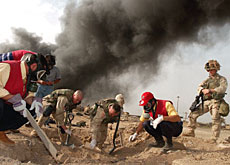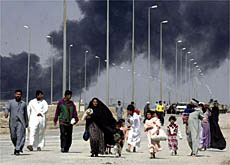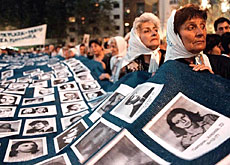ICRC calls for protection of Iraq’s dead

The International Committee of the Red Cross (ICRC) has called for urgent and coordinated action to secure mass graves in Iraq and identify the dead.
The Geneva-based agency said it welcomed the appointment of a United States official to oversee the protection of these sites and the search for missing persons.
“Our concern is what happened as a result of the latest war,” said Nada Doumani, chief ICRC spokeswoman in Baghdad, “and to ensure that there will be a process to identify these bodies.”
“It’s urgent to protect what can still be identified,” she told swissinfo.
According to Doumani, hundreds of people have been pouring into the ICRC’s offices in Baghdad each day to share various kinds of information, including details of mass graves.
“It’s hard for us to give a number but we think there are at least a dozen mass graves inside Baghdad… and maybe there are even more outside the city due to the latest hostilities,” she said.
An ICRC spokesman in Geneva, Florian Westphal, said the sites contained the bodies of both civilian and military victims of the Iraq war.
“During the worst of the fighting, some of the hospitals in Baghdad had no choice but to bury the dead in the their own graveyards,” he told swissinfo.
Mass graves
One of the organisation’s main concerns is that the unprotected burial sites are being disturbed, making it difficult or even impossible to identify the corpses.
“The process of trying to identify somebody in a mass grave is extremely complex and very painful,” said Westphal.
“So we would be worried about any of the evidence being perhaps destroyed or even stolen… or that people are being re-buried somewhere individually, without their identity having been established.”
Doumani confirmed that civilians had been “digging in the graves in a very disorganised and chaotic way” and that the ICRC had asked the occupying forces to take measures to protect these areas.
She added that the coalition had recently named a member of the US civil administration in Iraq to deal with the issues of human remains, missing persons and so-called hidden detention sites.
“Once this negotiator is in place, I hope they will take the appropriate measures and follow some of the guidelines we have recommended concerning mass graves and mortal remains,” said Doumani.
Missing persons
According to Westphal, the ICRC has issued the US forces in Baghdad with a set of recommendations, which were drawn up following a major international conference on missing persons in Geneva earlier this year.
“That meeting produced a wealth of information as to how exactly to handle this kind of situation,” said Westphal. “So let’s put that to use now in Iraq.”
The ICRC says it is mainly concerned with identifying the most recently buried bodies in Iraq, as well as processing requests from relatives of people who went missing during the conflict.
There are many sites around the country, however, which are left over from nearly two decades of previous conflicts.
Tens of thousands of people are estimated to have disappeared during the 1980s Iran-Iraq War, while at least 1,500 people are listed as missing from the 1991 Gulf War.
But according to Doumani, the bodies in these older graves will be much harder to identify.
“After 20 years, it will be very difficult to figure out the identity of a body, unless he or she carries an ID, which is quite unlikely,” she added.
Disappearances
There is also the question of unresolved enforced and involuntary disappearances under Saddam Hussein’s government.
“We face a huge task,” said Westphal, “and certainly there is a huge challenge as to the people who went missing during the last Iraqi regime… there are also a lot of requests from relatives of those people.”
“In the search for the missing, one of the challenges will be to make sure that everybody works on it, including non-governmental organisations and the Red Cross Movement,” he said. “We need to centralise all the data so that we can work together.”
Westphal added that the Iraqi people will also play an important role in solving many of the missing cases and that interviews with civilians in the vicinity of mass graves could also provide clues for identification.
“We obviously hope that in this changed political situation, people who were afraid before will come forward… the more we can find out, the better,” he said.
swissinfo, Anna Nelson in Geneva
The International Committee of the Red Cross has asked the occupying forces in Iraq to protect at least a dozen mass graves sites in Baghdad.
The Geneva-based organisation has also called for coordinated and urgent action to start identifying dead bodies, resulting from the latest conflict, as well as search for missing persons.
The agency fears that many burial sites are being disturbed, making the identification of corpses much more difficult.
Under the Geneva Conventions, which form the backbone of international humanitarian law, the occupying forces have an obligation to protect human remains and ensure their respectful burial.

In compliance with the JTI standards
More: SWI swissinfo.ch certified by the Journalism Trust Initiative


You can find an overview of ongoing debates with our journalists here. Please join us!
If you want to start a conversation about a topic raised in this article or want to report factual errors, email us at english@swissinfo.ch.